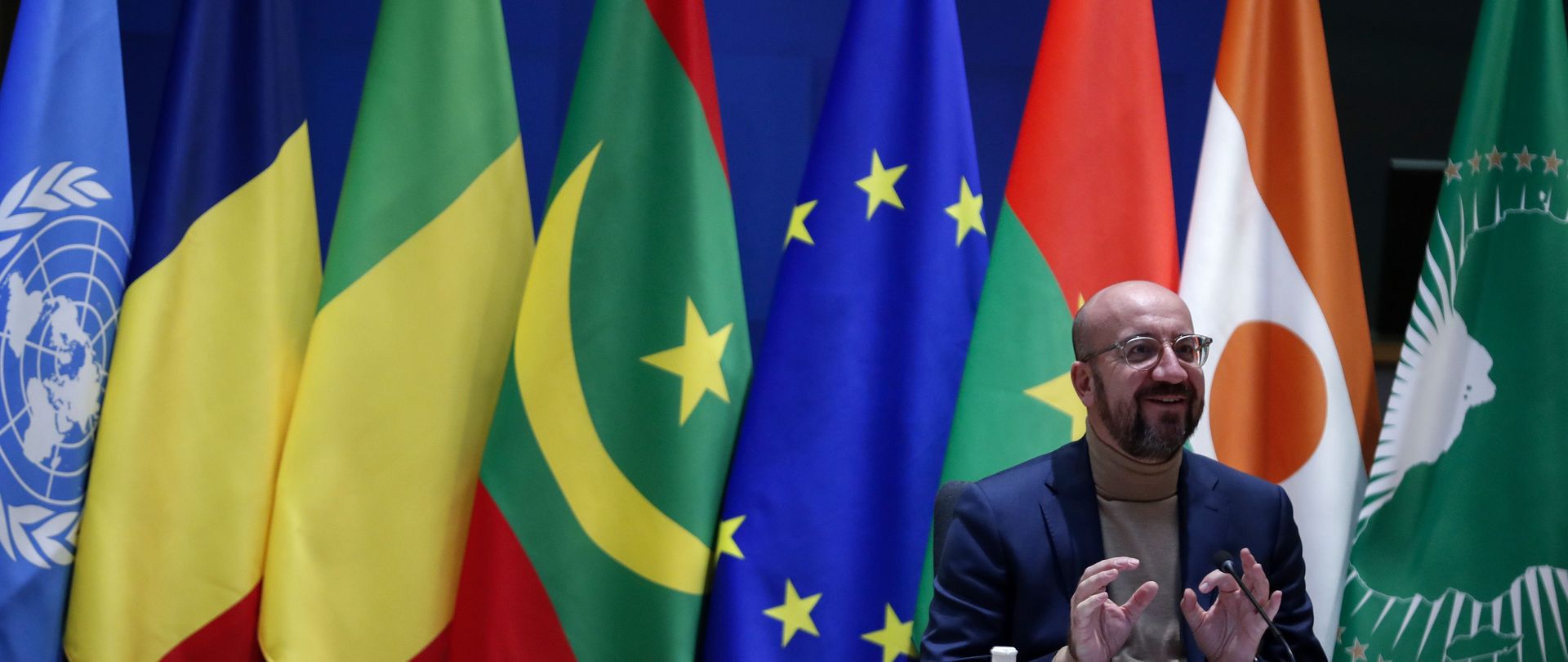
European Council President Michel in a video conference with G5 Sahel leaders and UN representatives
© picture alliance / ASSOCIATED PRESS | Francisco Seco

European Council President Michel in a video conference with G5 Sahel leaders and UN representatives
© picture alliance / ASSOCIATED PRESS | Francisco Seco
The EU sees itself as the protagonist of liberal and democratic multilateralism. Article 21 of the EU treaty (TEU) commits the European Union to supporting the rule of law and upholding universal human rights in its external actions. Since the EU possesses legal status at the international level, it can participate as a player in many international formats, in full respect of competences of the member states. At the United Nations, member states are also trying to develop common positions within the framework of the CFSP. Recently, the coronavirus pandemic has shown how the EU’s commitment to multilateralism has been reflected in global health policy. At the same time, the CFSP is considered to be a prototype of multilateralism, an example that multilateralism works and of how it works, and an inspiration for its advocates. The new US administration is likely to give multilateralism additional impetus as an appropriate response to the return of traditional great power politics and to pressing global challenges like climate change. This should give the EU a better chance to influence the future international order. In light of this, the EU is likely in the coming years to develop existing interregional partnerships, for example, those with Mercosur, the African Union and ASEAN, as well as its bilateral partnerships, as with African states or Brazil. The expansion of relationships in Central Asia and in the whole Indo-Pacific region will also be a central objective for the EU.
Since CFSP measures and other areas of EU external action are closely interwoven, conflicts of authority often arise between EU institutions. For example, under the Community Method, the Council of the EU decides together with the European Parliament by qualified majority on the priorities for the allocation of EU funds to candidate countries, neighbouring countries, development partners and other non-member countries. At the same time, member states decide unanimously on other aspects of relations with these countries within the framework of CFSP. This concerns, among other things, security requirements that member states increasingly impose on external actions of the EU, as in EU strategies like the Sahel Strategy, the Cybersecurity Strategy and the Counter-Terrorism Strategy. Non-member states make use of these conflicts of authority within the EU to advance their interests against the EU. Bringing the CFSP under the roof of the supranational EU institutions as a basis for a coherent and cohesive EU foreign policy could deprive them of this lever.
The need for adjustments at all levels of the European Sky Shield Initiative
doi:10.18449/2023C06
Narratives and Priorities for Europe after Russia’s Attack on Ukraine
doi:10.18449/2022C31
An Analysis of the Draft “Strategic Compass” of the EU
doi:10.18449/2022C03
The Franco-German relationship is more important than ever in order to deal with international crises and to develop a common European foreign and security policy. With elections coming up, William Glucroft discusses the strategic outlook with Ronja Kempin and Paul Maurice.
doi:10.18449/2021C16
Contribution to a Research Paper 2020/RP 04, 06.04.2020, 53 Pages, pp. 47–51
Next Steps for the EU
doi:10.18449/2020C47
COVID-19 pandemic reflects the EU’s powerlessness to act coherently on health matters—but it also reveals a path forward
China is increasingly seen as the central threat to the liberal Western world order. A growing sense that this shift is unstoppable creates a climate of discussion that overlooks important alternatives, writes Nadine Godehardt.
Contrary to initial concerns, the European Political Community is not a substitute for EU enlargement. The countries of the Western Balkans should use the forum to make their political mark and set priorities, say Margit Wunsch Gaarmann and Marina Vulović.
How has Germany's enlargement policy changed since Russia's aggression against Ukraine? Can the war revive the EU’s enlargement agenda for the Western Balkans? Discussion with Margit Wunsch Gaarmann and Heinrich Kreft, Head of the Centre for Diplomacy at the Andrássy University Budapest.
How the EU can secure the implementation of the “European proposal”
doi:10.18449/2023C17
An arena of geostrategic rivalry for the EU or a local power struggle?
doi:10.18449/2023C08
A Security Policy Flanking, Not a Revision of EU Enlargement Policy, Is Advisable
doi:10.18449/2022C21
How the United Kingdom wants to position itself as a reliable partner in a competitive global order
doi:10.18449/2023C24
ASEAN, the Association of Southeast Asian Nations, is avoiding a clear condemnation of Russia’s invasion of Ukraine. Nevertheless, Felix Heiduk and Gudrun Wacker believe that for Berlin and Brussels, there are starting points for dialogue and cooperation.
Status and Consequences for Germany and the EU after One Year of Brexit
doi:10.18449/2022C14
Five German and European Priorities for the Transatlantic Agenda
doi:10.18449/2020C61
On the Significance of China Competence for German and European Policy on China
doi:10.18449/2020C40